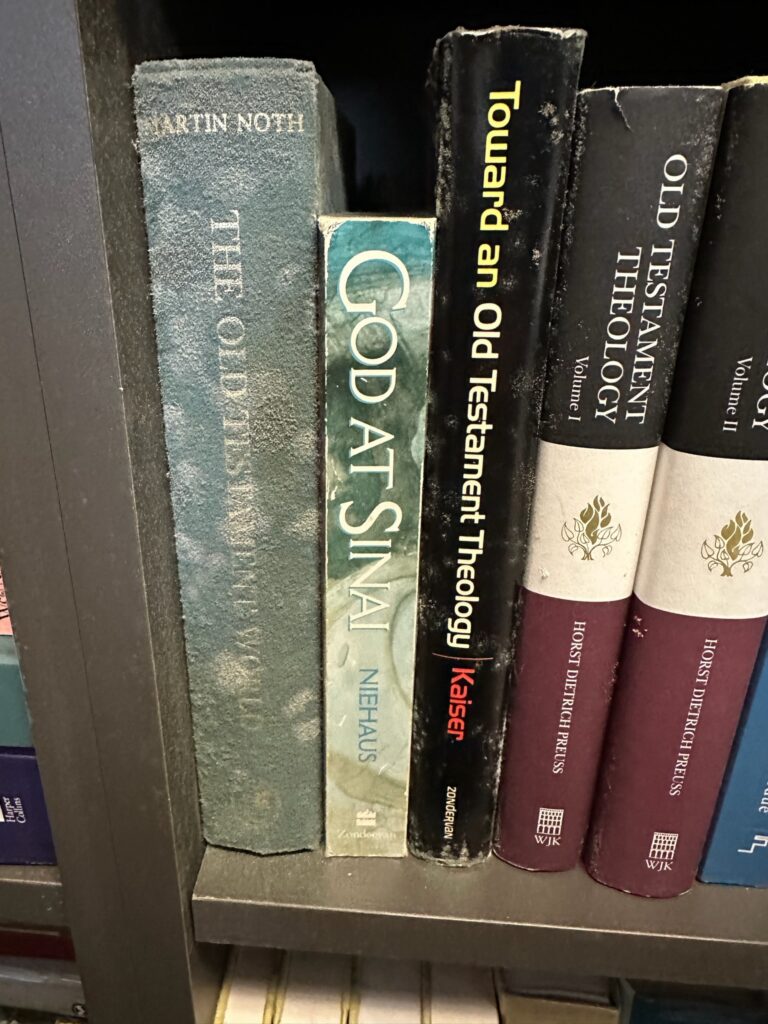Professors from the School of Theology and Christian Ministry (SOTCM) at Point Loma Nazarene University discovered, and reported to Campus Facilities, mold that had been found in multiple professors’ offices during the week of Oct. 23. PLNU then hired a third-party contractor to remove the mold and treat the books that had been affected in many professors’ offices, resulting in some professors having to temporarily move out of their offices.
According to Jessica Dunlop, administrative assistant to the dean of the School of Theology and Christian Ministry, five offices in the department were affected.
Kara Lyons-Pardue, professor of New Testament at PLNU, was one of the first to find the mold on some of her books during her advising appointments with students.

“I first noticed it the Monday after fall break [Oct. 23], but because I was busy with advising it was not until Wednesday [Oct. 25] that I looked and realized the extent of the damage,” Lyons-Pardue said. “Basically it was any clothbound book that was hardcover.”
After noticing that mold had also begun to appear on a cloth tote bag she kept in the office, Lyons-Pardue said she alerted some of her colleagues in the department to the problem. Lyons-Pardue said she was worried for health reasons, and especially concerned about the status of her extensive library. On Oct. 26 she alerted Jeff Bolster, vice president of University Services, to the incident.
“We have a response protocol that lives in facilities, so that was enacted once we were alerted,” Bolster said.
According to Bolster, their response protocol tends to assume the worst case scenario, although that is not often the case once they assess the damage caused by mold.
“Most often this issue is caused by a lack of air circulation in somewhere like a dorm or office,” said Bolster. “We’ve also had something like this happen in the library before. This issue in particular was more complicated because all of the books that had been affected.”
Dan Toro, associate vice president of facility operations and campus planning, said that once they were alerted they called in a third-party hygienist to come treat the books and offices.
“The reality is that this is a pretty common issue in most libraries,” Toro said. “When you have books, you naturally have to protect against moisture.”
Toro said there were a number of factors at play, including climate control, the number of books that were in the office that functioned as insulation and made the space more conducive to an environment that creates mold and a lack of airflow throughout the building.
Toro also said the HVAC system could have made for conditions that allow for mold growth.
“When these buildings were originally designed, the HVAC was designed for a use that was appropriate when it was designed,” Toro said. “We’re talking 20, 40 years ago. And now, the way we use the building looks very different. The practices in that building are different, the occupancy in that building is different. As a result, you have an HVAC system supporting what would have been an occupancy in that building forty years ago, but now we have more people in the space.”
The HVAC system was just one of a few variables they were working against, according to Toro. Other factors at play include higher moisture content in the air on a campus so close to the ocean.
“When we discover something, we try to do that root cause analysis and see why the environment is behaving in a certain way that brought us to this outcome,” Toro said. “Then we can fix the root cause, so we aren’t just wiping down a surface that has mold again five weeks later.”
Toro said that besides treating the affected books and offices via a third-party contractor, they have also been working with the occupants of some of the rooms to make sure that airflow isn’t blocked in their offices.
Toro did not speak on other current cases of mold on campus, but said the severity of cases vary and they can’t be addressed unless students and staff are proactive about reporting potential incidents to facilities. The only time that facilities go through and inspect rooms without a request is at the beginning and end of each school year.
“I don’t think there’s such a thing as over-reporting,” Toro said. “I would err on the side of just letting us know if there is something making you uncomfortable or you feel that you want attention on something. Our job is to provide a service. If we get the feedback, we’ll respond to what’s going on.”
To contact PLNU facilities and/or submit a work order, visit https://www.pointloma.edu/offices/campus-facilities.

